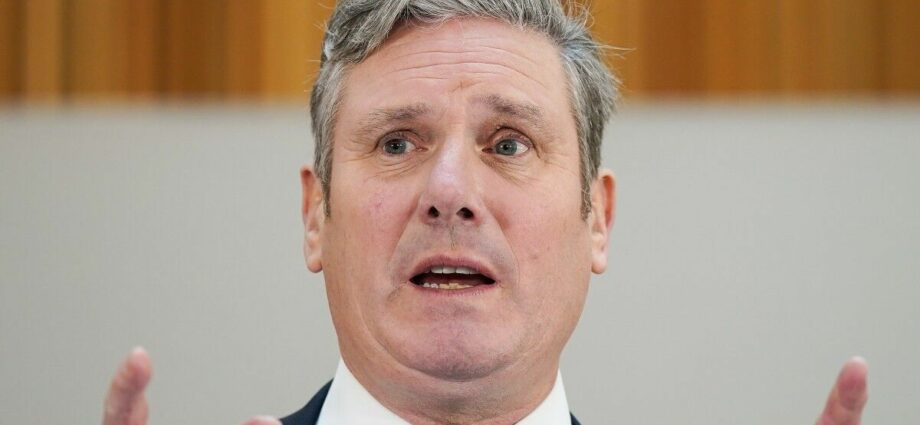Brexit: There's 'no case' for returning to the EU says Starmer
We use your sign-up to provide content in ways you’ve consented to and to improve our understanding of you. This may include adverts from us and 3rd parties based on our understanding. You can unsubscribe at any time. More info
Sir Keir Starmer has been accused of trying to outflank the Tories on Brexit. The Labour leader today insisted there is “no case” for Britain rejoining the EU or the single market as he set out a tough stance on the issue.
Sir Keir’s comments, which are likely to infuriate the Remainer wing of his party, are widely being seen as an attempt to win back voters in the northern Red Wall who deserted Labour in the 2019 general election.
But Conservative Brexiteers have questioned the change of heart by the Labour leader, who was shadow Brexit secretary under Jeremy Corbyn and previously backed a second referendum.
European Research Group chair Mark Francois told Express.co.uk: “I welcome Sir Keir Starmer’s clear commitment that Britain should not rejoin the EU single market – but as someone who watched him doing everything he could do in the previous Parliament to keep Britain in the EU, I still believe that he remains a Remainer at heart.”
Dudley North MP Marco Longhi said: “Keir Starmer is blatantly trying to out-Tory the Tories in the Red Wall. But he’s fake and everybody can see through him.
“Nobody will ever forget that he was Labour’s chief Remain architect who even persuaded Corbyn to go Remain.

“He’d have us Rejoin tomorrow, he’d give in to Sturgeon’s separatist agenda and he’s an anti-monarchist – while pretending to be the opposite of all of these – and everybody can see him for what he is.”
Ashfield MP Lee Anderson added: “Sir Keir is coming across as a desperate politician these days in his pathetic attempt to win over Brexit-supporting Red Wall areas.”
Brexiteer Tory Andrew Bridgen added: “He’s been promoted from Captain Hindsight to Major Reversal.”
It comes after Sir Keir today dismissed the prospect of Britain rejoining the single market if he takes the keys to No 10 at the next general election, insisting the move would not uplift the UK’s economy.
The Labour leader claimed trade has “gone down” because “the deal that we’ve got is not a very good deal”, arguing there is a case for a “better Brexit”.

Sir Keir’s latest comments come just weeks after he ruled out a Swiss-style deal with the EU after reports Rishi Sunak’s Government was considering the arrangement in order to access the single market.
Asked this morning if being part of the single market would boost economic growth, the Labour leader told BBC Radio 4’s Today programme: “No, at this stage, I don’t think it would.
“And there’s no case for going back to the EU or going back into the single market.”
He added: “Do I think, just to take your question head on, that going back into years of wrangling, years of uncertainty, is going to help our economy? No, I don’t.”
Pressed on whether such a move could boost growth in future, he said: “No, I don’t think having left … I argued for remain, as everybody knows.
“We left, and having left, there is no case now for saying go back.

“And going into the single market and customs union, we’ve had this debate endlessly over the years, 2016-19, is effectively going back in.
“I do think that we can have a deal that operates better than the deal that we have got, and that’s what I would seek to do. And that’s what I mean by making Brexit work.
“But I do also fundamentally believe that if we don’t address the other underlying issues that have bedevilled growth in this country … then we will not actually be able to fix the problems that we’ve got.”
Sir Keir also said he sympathised with the sentiments of those who voted to leave the EU as he unveiled Labour’s blueprint for political and economic devolution.
Speaking this morning at the launch of the report of Labour’s commission on the UK’s future, headed by ex-premier Gordon Brown, Sir Keir said: “They wanted more control over their lives, more control over their country.
“They wanted to create opportunities for the next generation – build communities they felt proud of, have public services they could rely on.”
Source: Read Full Article
-
Fury after Humza Yousaf meets with Erdogan as David Cameron threatens cut-off
-
Influential Tory MP demands tax cuts be scrapped as he turns on Truss
-
Leader of International Seabed Mining Agency Admonished by Diplomats
-
Russian Forces In Ukraine Face Fresh Accusations Of War Crimes In UN Rights Probe
-
No Tax Hike For People Making Less Than $400,000 Annually, Biden Reiterates

